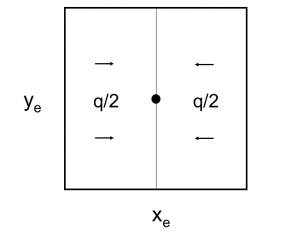Difference between revisions of "4/π stimulated well potential"
From wiki.pengtools.com
(→Nomenclature) |
(→Brief) |
||
| (16 intermediate revisions by the same user not shown) | |||
| Line 2: | Line 2: | ||
[[File:fracture linear flow.png|thumb|right|300px| Stimulated well drainage]] | [[File:fracture linear flow.png|thumb|right|300px| Stimulated well drainage]] | ||
| − | [[4/π stimulated well potential |4/π]] is the maximum possible stimulation potential for steady state linear flow in a square well spacing. | + | [[4/π stimulated well potential |4/π]] is the maximum possible stimulation well potential for steady state linear flow in a square well spacing. |
==Math & Physics== | ==Math & Physics== | ||
| Line 14: | Line 14: | ||
From [[Darcy's law]]: | From [[Darcy's law]]: | ||
| − | :<math>\frac{q}{2}=\frac{kA}{ | + | :<math>\frac{q}{2}=\frac{kA}{\mu}\ \frac{dP}{dx}</math> |
:<math> A =y_e*h</math> | :<math> A =y_e*h</math> | ||
| − | :<math>dP=\frac{q | + | :<math>dP=\frac{q \mu}{2ky_eh} dx</math> |
| − | Integration gives: <math>P-P_{wf}=\frac{q | + | Integration gives: <math>P-P_{wf}=\frac{q \mu}{2ky_eh} x</math> |
Since average pressure is: <math>\bar P = \frac{\int P dx}{\int dx}</math> | Since average pressure is: <math>\bar P = \frac{\int P dx}{\int dx}</math> | ||
| − | :<math> \bar P = \frac{ \int \limits_{0}^{x_e/2} \left ( \frac{q | + | :<math> \bar P = \frac{ \int \limits_{0}^{x_e/2} \left ( \frac{q \mu}{2ky_eh} x + P_{wf} \right ) dx}{\int dx} = \left. \frac{q \mu}{2ky_eh} \frac{x}{2} \right|_{x=0}^{x=x_e/2} + P_{wf} = \frac{q \mu x_e}{8ky_eh} + P_{wf}</math> |
| − | <math>J_D=\frac{q | + | :<math>J_D=\frac{q \mu}{2 \pi k h} \frac{1}{( \bar P - P_{wf})} =\frac{q \mu}{2 \pi k h} \frac{8ky_eh}{q \mu x_e} = \frac{4y_e}{\pi x_e}=\frac{4}{\pi}</math> |
==See also== | ==See also== | ||
| + | [[6/π stimulated well potential]]<BR/> | ||
| + | [[JD]]<BR/> | ||
[[:Category:optiFrac | optiFrac]]<BR/> | [[:Category:optiFrac | optiFrac]]<BR/> | ||
[[:Category:fracDesign | fracDesign]]<BR/> | [[:Category:fracDesign | fracDesign]]<BR/> | ||
| Line 35: | Line 37: | ||
==Nomenclature== | ==Nomenclature== | ||
| − | :<math> A </math> = cross-sectional area | + | :<math> A </math> = cross-sectional area, cm2 |
| − | :<math> k</math> = permeability | + | :<math> h </math> = thickness, m |
| − | :<math> | + | :<math> J_D</math> = dimensionless productivity index, dimensionless |
| − | :<math> P </math> = pressure | + | :<math> k</math> = permeability, d |
| − | :<math> q </math> = flow rate | + | :<math> P </math> = pressure, atm |
| + | :<math> P_i </math> = initial pressure, atm | ||
| + | :<math> \bar P</math> = average pressure, atm | ||
| + | :<math> q </math> = flow rate, cm<sup>3</sup>/sec | ||
| + | :<math> x </math> = length, m | ||
| + | :<math> x_e</math> = drinage area length, m | ||
| + | :<math> y_e</math> = drinage area width, m | ||
===Greek symbols=== | ===Greek symbols=== | ||
| − | :<math> \mu </math> = | + | :<math> \mu </math> =viscosity, cp |
[[Category:Technology]] | [[Category:Technology]] | ||
| + | [[Category:pengtools]] | ||
[[Category:optiFrac]] | [[Category:optiFrac]] | ||
[[Category:optiFracMS]] | [[Category:optiFracMS]] | ||
[[Category:fracDesign]] | [[Category:fracDesign]] | ||
| + | |||
| + | {{#seo: | ||
| + | |title=Hydraulic fracturing formulas 4/π | ||
| + | |titlemode= replace | ||
| + | |keywords=hydraulic fracturing, hydraulic fracturing formulas, well potential | ||
| + | |description=Hydraulic fracturing formulas maximum possible stimulation well potential for steady state linear flow 4/π | ||
| + | }} | ||
Latest revision as of 06:40, 10 December 2018
Brief
4/π is the maximum possible stimulation well potential for steady state linear flow in a square well spacing.
Math & Physics
Steady state flow boundary conditions:
From Darcy's law:
Integration gives: 
Since average pressure is: 
See also
6/π stimulated well potential
JD
optiFrac
fracDesign
Production Potential
Nomenclature
 = cross-sectional area, cm2
= cross-sectional area, cm2 = thickness, m
= thickness, m = dimensionless productivity index, dimensionless
= dimensionless productivity index, dimensionless = permeability, d
= permeability, d = pressure, atm
= pressure, atm = initial pressure, atm
= initial pressure, atm = average pressure, atm
= average pressure, atm = flow rate, cm3/sec
= flow rate, cm3/sec = length, m
= length, m = drinage area length, m
= drinage area length, m = drinage area width, m
= drinage area width, m
Greek symbols
 =viscosity, cp
=viscosity, cp








